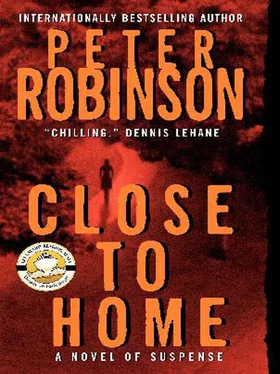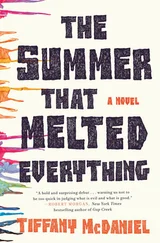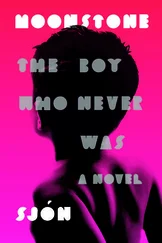“Mind if we have a little look around?” Annie asked.
“What? Why? I’ve told you. I’ll give you everything you want.” She got up and went over to the tapes, picking out three. “These for a start. The writings are in-”
“Why are you so jumpy, Liz?”
“I’m not jumpy.”
“Yes, you are. I think we should have a look around the place.”
“You can’t do that. You need a search warrant.”
Banks sighed. Again . “Are you certain you want that?” he asked. “Because we can get one.”
“Go do it then. Get one.”
Banks looked at Annie. “DI Cabbot, will you please go-”
Liz looked from one to the other, puzzled. “Not just her . Both of you go.”
“It doesn’t work like that,” said Banks. “One of us has to stay here to make sure you don’t interfere with anything. We’d hardly be doing our jobs if we disappeared and let drug dealers flush their stuff down the toilet, would we?”
“I’m not a drug dealer.”
“I’m sure you’re not. But there’s something you don’t want us to find. I’ll stay here while DI Cabbot gets the warrant, then she’ll come back with four or five constables and we’ll tear the place apart.”
Liz turned so pale Banks worried she might faint. He could tell she was sensitive, and he didn’t like bullying her, but he didn’t like what had happened to Luke, either. “What’s it to be, Liz? Will you give us consent to look around now, or do we do it the hard way?”
Liz looked up at him, big eyes brimming with tears. “I don’t have much choice, do I?”
“There’s always a choice.”
“You’d find it anyway. I told Ryan he was stupid to keep it.”
“Find what, Liz?”
“It’s in the cupboard by the door, under the sleeping bag.”
Banks and Annie opened the cupboard by the door and moved aside the sleeping bag. Underneath it was a battered leather shoulder bag, exactly the kind that Luke Armitage had been carrying when the bullies taunted him in the market square.
“I think you and Ryan have got quite a bit of explaining to do, don’t you?” said Banks.
The Bridge Fair came every March. As a young boy, Banks would go with his parents. He remembered sitting on his father’s knee in the Dodgem car, clinging on for dear life, remembered the feel of the rough nap and the raw-wool smell of his dad’s jacket, the sparks flashing off the high poles. He remembered strolling around holding his mother’s hand, eating candy floss or toffee apples while she nibbled at brandy snap and his father ate a hot dog smothered in fried onions. He would hear his father curse as he tried to throw biased darts at playing cards and his mother laugh as she tried to toss Ping-Pong balls into goldfish bowls.
But when Banks was fourteen, he wouldn’t be seen dead at the fair with his parents; he went with his mates, and Saturday night was the big night.
Why was it, he thought, as he drove past the small roadside fair that had sparked his memory, that they always seemed to be playing old rock and roll music at fairgrounds, even in the sixties? Whenever he thought of nights at the fair with Paul, Graham, Steve and Dave, it was always Freddy Cannon’s “Palisades Park” that played in his mind, or Eddie Cochran’s “Summertime Blues” as the Waltzers spun and the bright lights blazed in the dark, not The Beatles or The Rolling Stones.
His favorite ride was the Caterpillar, but you had to go on that one with a girl. As the train went faster and faster in undulating circles, the canvas cover, like a shop’s awning, would slowly unfurl until it covered up the whole ride – hence the name Caterpillar – and you were in the dark, riding fast with your girl. On his own, he liked the Waltzers and the Speedway best, but all rides were better shared with girls when you were fourteen.
For Banks and his friends, the fair began before it opened. He remembered passing the stretch of common ground with Graham one wet afternoon – it must have been 1965, because that was the only year Graham was around for the spring fair – and watching the brightly colored lorries roll in, watching the suspicious and unsmiling fair-workers unload sections of track and cars and begin the magical process of fitting the whole thing together. For the next two days, Banks would come back to check the progress, watch the men put the last section of the carousel into place, set up the booths, the stalls and the shies, and sure enough, everything was ready on opening night.
You had to go after dark. There was no point if the bright-colored lights didn’t flash and spin and if the music wasn’t loud, if the smell of fried onions and spun sugar didn’t waft through the night air to mingle with the discernible whiff of violence. For the fairs were where you went to pick a fight or settle your scores, and you could always see trouble brewing a mile off. First the looks, the whispers, the casual bumps, then someone running, others in pursuit, a scuffle and muffled cries, the fair-workers always somehow outside or beyond it all, stepping between the spokes as the Waltzers got faster and faster, collecting money, impressing the girls with their daredevil nonchalance.
And the girls… Well, the girls were all on parade at the fair, all bubble gum, miniskirts and eye shadow. “If you didn’t get shagged on Saturday night, you didn’t get shagged at all,” as the old rugby song went. Well, Banks didn’t get shagged, but he sometimes got kissed. That night it was Sylvia Nixon, a pretty little blonde from the girls’ school down the street. They’d been eyeing each other shyly all night, standing up on the boards right beside the rides, watching the riders scream and yell and cling on tight. She was with her quiet friend, June, that was the problem. Which Graham, bless his soul, helped solve. Soon they were off on the Caterpillar, and Banks felt that delicious anticipation as the cover started to close over them.
But something odd happened later.
Banks was persuading the girls to come with them to the park the next day if the weather was fine. There were plenty of sheltered, well-hidden areas where you could lie in the grass or stand up against a tree and snog. He was almost there, just overcoming the last, perfunctory shreds of resistance, when Graham said, “Sorry, I can’t go tomorrow.” When Banks asked him why, he just smiled vaguely and answered with his characteristic evasiveness, “I’ve got something else to do, that’s all.” The girls weren’t too thrilled with that, and Banks never got to go out with Sylvia Nixon again.
A fight broke out somewhere near the Dodgems, Banks remembered, and a couple of older men broke it up. But his chief memory, apart from kissing Sylvia on the Caterpillar and Graham’s weak reason for missing the next day’s rendezvous, was that Graham paid. Again. He had Benson amp; Hedges, too: ten of them, king-size, in the golden packet.
As Banks turned off the A1 to Peterborough, he racked his brains trying to remember if he had ever asked Graham where he got his money, but he didn’t think he had. Maybe he didn’t want to know. Kids are selfish, and as long as they’re having a good time they don’t feel the need to question where it’s coming from, or at whose expense it might be. But there weren’t many places a kid Graham’s age could get his hands on so much ready cash. The paper round wouldn’t cover it, but an occasional dip in the till might. Or perhaps he stole it from his mother’s purse?
The trouble was that it didn’t seem to matter so much, just as long as Graham had the money. That he was generous went without saying. But what had he done to get it, and where, and whom, had he got it from?
Now, Banks also found himself wondering what it was that Graham had to do that Sunday that was so much more important than snogging with Sylvia Nixon’s friend June in the park. And he remembered other occasions, too, right up until the day of his disappearance, when Graham simply wasn’t there. No reason, no excuse, no explanation.
Читать дальше












